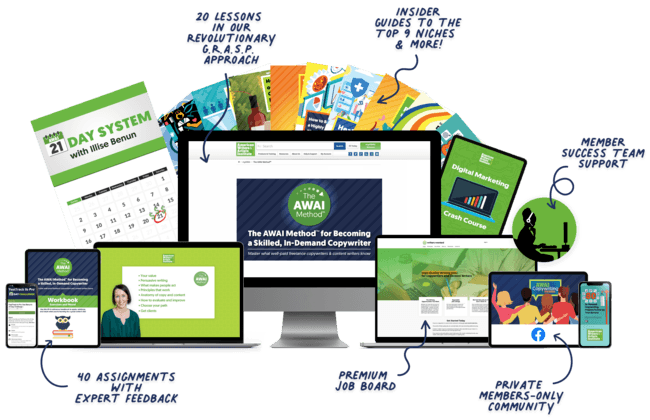
What Is the Job Description of a Copywriter?
In our introductory what is copywriting section, we explained that a copywriter is a professional writer responsible for writing the text, or copy, used in marketing and promotional materials.
But this definition barely scratches the surface.
A copywriter can assist a company with their marketing, consult on a range of topics, or provide many other services depending on their current skill set.
If you asked a hundred different copywriters what they do every day, you’d likely get a hundred different answers.
In this section, we’ll try to break down some of the common features of a copywriter’s job description.
Copywriter Responsibilities
Copywriters are responsible for creating engaging, persuasive, and concise copy for various advertising platforms. Their day-to-day responsibilities include keyword research, crafting engaging content, and proofreading the final copy to ensure its quality.
The projects copywriters work on will typically fall into one of the main types of copywriting.
But there is far more involved in creating these projects than simply putting words on a page.
Nearly all copywriting projects will also involve one of more of the following tasks to complete.
1. Researching
We touched on this when we discussed the basics of copywriting, but solid research is the foundation for nearly all copywriting projects.
Finding out facts to support your claims, interesting details to include in your copy, or relevant stories from the past or present will all work together to engage your readers and make your copy really stand out.
What research will you need to do? This can vary from project to project, but may include some, or all, of the following:
- Online research, such as referencing industry-specific databases, reports, online forums, or product reviews
- Interviews with your clients or others
- Reviewing other similar copywriting projects, both from your client and other sources
- Studying books and scientific journals
- Brainstorming what you already know about the topic
- If you’re writing about a product, getting a sample to examine and use
- Visiting libraries, museums, or other organizations that may have additional information on your subject
Taking the extra time needed to conduct thorough research like this is guaranteed to improve the quality of your final copywriting project.
2. Writing, Editing, and Proofreading
Writing the first draft of a piece of copywriting requires an excellent understanding of what’s needed for that particular project and getting all the necessary parts in the right places.
The actual writing process largely depends on your writing style. You may prefer to plan out your project in detail before writing your first draft.
Or, if you’re a more spontaneous writer, you may be able to get away with less detail in your outline.
But, regardless of your approach, winning copywriting follows a specific structure that’s proven to be most effective for that particular piece of writing. So, you will need to do some planning and at least have a rough outline of your project before writing the first draft.
Once you’ve gotten more experience, you may be able to bend these standard structures a bit. But as a new writer, you should always stick to them as best you can.
This doesn’t mean you can’t be creative in copywriting. In fact, creativity is essential to bring life to whatever you write. Boring copy is ineffective copy, and it won’t get you very far in your career.
A core skill of copywriting is keeping your copy interesting and engaging while incorporating all the other technical aspects needed for that type of copywriting.
This is the challenge of writing your first draft.
After it’s done, you’ll need to edit and proofread your work. This is the stage where you take a first draft from being functional to exceptional.
To do this well, you’ll need a good grasp of grammar and syntax in the language you’re using to write the project. You’ll also need to ensure the tone of the work is appropriate for the audience, the language is at an appropriate reading level, and any industry-specific terms and concepts have been included when necessary.
Another part of editing will come after you’ve completed the project and given it to your client or employer to review.
They may come back with additional edits for you.
This is all part of the job, and getting their feedback is vital to improve the final product and make sure it contains everything they need. It’s a collaborative process, with everyone’s goal being to put out the best copy possible.

3. Managing Projects and Tasks
Whether you’re a freelance or staff copywriter, which we’ll discuss in more detail in the next section, you’ll usually need to manage multiple projects at once and streamline your daily tasks.
We’re not kidding when we say copywriters are in high demand. And once you’ve gotten some experience and have established yourself as a professional copywriter, you will be BUSY.
Many copywriters report the time they felt they had “made it” as a copywriter was when they started turning away new work because they already had too much!
If you choose to become a copywriter, you’ll be facing the same situation all too soon.
There are countless individual methods for managing your daily tasks, as well as planning out how you’re going to complete larger projects over a period of time.
Different methods work well for different people, so explore some different approaches to see what works for you. And when you find a good method, stick to it.
To get you started, Heather Robson has some great suggestions on how to get every writing project off to a great start.
Also, Christina Gillick shares six tips for estimating your project times.
Your 9-Step Blueprint to Becoming a Well-Paid Copywriter
Sign up below and get instant access to your FREE 9-step blueprint for making good money as a writer
PLUS receive our FREE daily newsletter, The Writer’s Life, packed with powerful insights, strategies, and expert advice on how to make a great living through writing.
By providing your email today, you’re giving consent for us to contact you by email. We do not sell your personal information to other companies, and you can withdraw consent at any time. By submitting this form, you agree to our Privacy Policy.
Where Do Copywriters Work?
There’s no one answer here.
Copywriters have options for where they work, with the most common three below.
As a copywriter, you can choose to stick with only one of these options, or use a combination of all three.
1. For a Company
Many companies, both online and offline, hire staff copywriters to meet their copywriting needs. That said, these positions can take a variety of different forms, just like many other jobs.
They can range from being part time to full time and can be temporary or permanent. They may or may not include health or other benefits. They can also be in-house or work-from-home positions, or a combination of the two.
If you prefer the predictability of a regular job and a regular paycheck, this can be an excellent option as a copywriter. And with the ever-increasing selection of copywriting jobs available, there’s most likely one that suits your current life situation perfectly.
2. For Themselves
A large portion of copywriting work is freelance work. As a freelance copywriter, you are responsible for finding individual clients and you work on a contract basis.
We get into more detail on how to do this in the section on how to find copywriting jobs. But for now, rest assured that freelance work is in high demand and can pay very well. In fact, it can often pay even more than a staff position because you have greater control over the type of work you pursue and how much you make.
You may find clients that want just one copywriting project and that’s the only work you’ll do for them. But many others will want repeating projects, such as monthly newsletters or blog posts. And still other clients may have so much work they need done, you’ll find you only need that one client!
Even if you’re technically working as a freelancer, in many ways, it can often feel like you’re a staff member.
As a freelancer, you can also physically work from wherever you like. Most freelance copywriters work with clients throughout the world, all from their home computer.
This flexibility is one of the greatest advantages of being a freelance copywriter.
For further details, check out our webinar on creating a blueprint for becoming a working copywriter or our Getting Clients Roadmap program.
3. For an Advertising Agency
Ad agencies are businesses that create and manage advertising, copywriting and content writing, and sometimes other aspects of marketing for other businesses.
And, guess what? They need a lot of copywriters to write all that material.
Depending on the ad agency, they may hire in-house staff or freelance copywriters. As a freelancer, the main benefit of working with an ad agency is the fact they already have clients, and often a lot of work.
What Qualifications Do You Need to Become a Copywriter?
You don’t need any official qualifications to work as a copywriter.
Many of the highest-earning copywriters today were self-taught and learned the skills they needed through personal study and practice.
However, many of them were also able to draw on skills they had learned in previous careers as well as life experience.
Whether you’re coming from a professional career, or simply have in-depth knowledge of an area that interests you, these can all give you an advantage as a copywriter.
Have you worked as a nurse or other medical professional? Maybe copywriting for the medical industry is right for you.
What if you worked in customer service at a car repair shop? You would have excellent insider knowledge to write copy for the auto industry.
Or maybe you’re just interested in scrapbooking? You could easily start a money-making website all about scrapbooking.
But, if you want to get into an area of copywriting that’s completely new to you, that can also be done. You’ll need to take the extra step of learning the essential elements of that industry in addition to the basics of copywriting, but many copywriters have done exactly that and have become very successful in their new industry.

What Skills Do Copywriters Need?
The skills you bring to copywriting are far more important than any previous credentials you may or may not have.
The copywriting world is very driven by results. If the copy you write is bringing in customers and increasing a company’s sales, you’ll become a highly sought-after copywriter in no time.
What follows are some of the core skills you’ll need to excel as a copywriter.
1. Writing Skills
This skill is the most obvious, but it’s also easily dismissed.
And that would be a mistake.
To write professional-grade copy, the most important thing is to be able to express your ideas clearly and conversationally. This means organizing your writing in a logical way, following the basic structure of persuasive writing, and using easy-to-understand language.
For example, some projects may require a logical and compelling argument as to why a reader should take a certain action. You may also need to explain step-by-step procedures, how a product or service works, scientific findings that relate to a product, or simply a company’s refund policy.
In all these examples, you can see the importance of clear and concise copy that explains a topic in detail, but without going overboard and adding unnecessary “fluff.”
If your writing confuses a reader in any way, your writing has failed. That person will most likely move on and disregard what you wrote.
So, take the time to sharpen your writing skills. This one factor is guaranteed to make your copy stand out from the rest.
2. Copywriting Knowledge and Skills
Whichever area of copywriting you choose to specialize in, it’s vital you develop in-depth knowledge of that industry and the types of copywriting it uses.
For example, if you choose to specialize in writing for B2B companies, learn everything you can about what types of projects B2B companies use, and how to write them. These are a few ways you could start:
- Take the best training available, both online and offline, on copywriting for the B2B industry
- Read books on B2B copywriting
- Visit B2B companies’ websites and see what types of copy they have
- Subscribe to the companies’ email lists and read what they send you
- Go to B2B trade shows to speak to companies directly
The same goes for any other area of copywriting.
The more you can learn about the industry and how to write the copy it uses, the more prepared you’ll be to hit the ground running as a skilled copywriter.
Wondering where to start? Check out our page on acquiring the skills needed to make a living as a writer.
3. Communication Skills
It may sound like copywriting is very solitary work, but this is rarely the case.
Yes, you’ll spend blocks of time writing alone. But the daily life of a copywriter can also involve a fair amount of interaction with other people.
If you work in-house for a company, you’ll need to communicate with coworkers and your manager on a regular basis. Freelance copywriters also need to work closely with their clients. Depending on the type of work you’re doing, it may require regular meetings with your client or other members of their team.
Other projects may require less communication, but you’ll always need to touch base as the work progresses.
Most copywriters are also actively involved in the copywriting community, so you may want to reach out to other copywriters with questions, attend copywriting masterminds, or participate in critique groups.
In fact, most copywriters will tell you these personal interactions with your clients and other copywriters can be one of the best parts of the job. When you’re a copywriter, you’re always learning how to do your job better. And communicating with others in the field will only improve your knowledge and skills as a copywriter.
4. Empathy
As we discussed in the basics of copywriting, understanding your audience is essential for writing effective copy.
You need to be able to understand your prospect’s point of view in order to write copy they can relate to. And the only way you can really get into their head — and their heart — is to cultivate a keen sense of empathy.
In copywriting, empathy is an awareness or understanding of the thoughts, feelings, and experiences of your prospect without them telling you about these things directly.
As you research a potential prospect for a copywriting project, attempt to imagine what their life might be like, and the sorts of things they might do. Give the person a made-up name to make them more “real.” Some copywriters will even put a picture of their potential prospect on the wall next to their computer.
Steps like these help cultivate greater empathy for your readers and allow you to write high-quality copy tailored just for them.
What Other Roles Can Copywriters Play?
As a copywriter, you don’t have to limit yourself to just writing.
Copywriters have a valuable skill set that can be applied to a range of other professional roles.
If you have a background in website design, graphic design, copyediting, marketing, or other specialties related to copywriting, you can add these to your copywriting services.
Once you’ve gotten some experience copywriting, you can also teach others your skills. You can teach the practical copywriting skills you’ve learned or coach other copywriters on marketing themselves and building their copywriting careers.
You could also offer in-person events or seminars, such as going to individual businesses to train their in-house staff, or hold training events where participants come to you.
Copywriting is part of nearly every business in the world. But the role copywriting plays in each business will always be slightly different.
This creates an enormous potential for you to essentially write your own job description as a copywriter. So, dream big and go after your ideal copywriting job.
Summary
The job description of a copywriter can take many different forms.
You may choose to work for an employer, an ad agency, or for yourself as a freelance copywriter.
Regardless of where you work, all copywriters need a core set of skills. But, depending on the area of copywriting you decide to specialize in, your daily tasks and responsibilities may branch out in countless different directions.
That’s one of the reasons why copywriting can be adapted to suit almost anyone’s lifestyle. No matter where you’re at in life, there’s almost certainly a copywriting job that will fit you perfectly.
The AWAI Method™ for Becoming a Skilled, In-Demand Copywriter

Everything you need to start getting paid to write:
- Hands-on training…
- Assignments with feedback…
- A portfolio of five professional samples…
- Help landing well-paying clients…
- And more!





